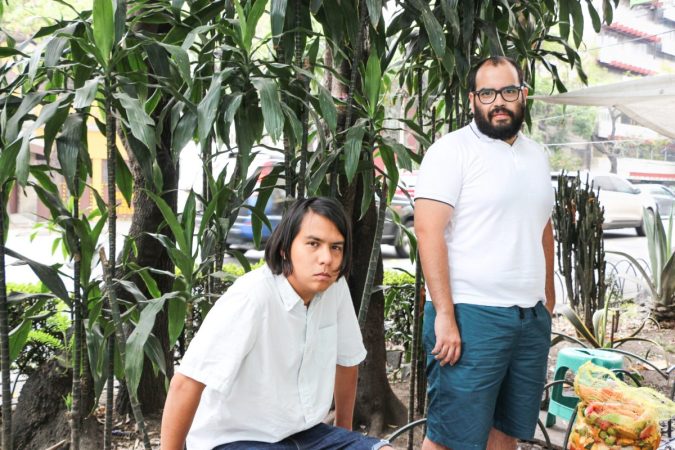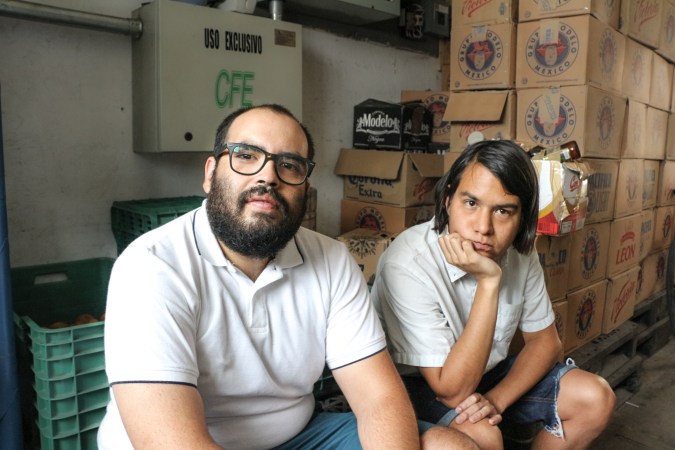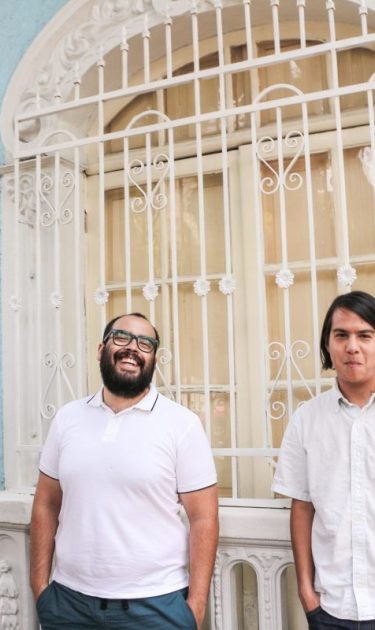In theory, artists that follow the Los Blenders formula aren’t supposed to become big. The garage act from Coapa – the home of Mexico City cover bands – has spent most of their journey getting drunk and playing no-frills garage punk odes to alcohol, inspiring slam dancing every time they take the stage. Yet, after U.S. tour dates, numerous festival appearances, a non-stop gigging schedule in Mexico, and the ever-growing momentum of 2015’s Chavos Bien LP, here they are in 2017, playing Coachella, on the verge of becoming the nation’s next great rock band. How did that happen?
Things aren’t quite what they seem for the quartet. For one, vocalist and guitarist Alejandro Archundia says they take themselves more seriously now. “I actually think of it as my job, since I make a living from it. We stopped getting completely wasted whenever we played; it was our way to wind down from being at the office all week on a Saturday night. We try to give something back to the crowd.” The band recently played Mexico City TV network Canal 11 and connected with fans on a new level. “One guy told us he comes from Chalco. We asked him how long his commute was, and he told us he took a bus that takes an hour to take him to the nearest subway station, plus walking to the studio. People are making a big effort to see us.”

Archundia says the inspiration to take their music more seriously came down to a shift in their fanbase. “When we started, we were better known among ‘music experts’ and the hipster crowd; people who don’t go to shows to have a good time. Then we got a more teenage crowd who are similar to how we used to be – they go to shows to have a great time. They don’t give a shit,” he continues. “At that Canal 11 session, we saw kids lying on the floor and getting up to fuck shit up again. It’s something that’s really important for them, and perhaps they will outgrow us because it happened to me.”
“When are we going to make things better? If we have great Mexican bands, everybody benefits.”
For drummer Guillermo Pacheco, Los Blenders’ brand of devil-may-care lyricism fuels their passionate fanbase. “I think people identify with our songs and what we play. When you feel like a song understands you, it’s a little like rancheras – those are songs for people who feel emotional pain and they let it out singing when they are drunk. It’s a similar feeling because our songs are not about that, but we get people saying ‘that happened to me.’”
When Los Blenders played Coachella earlier this year, they got more than they bargained for. Though it didn’t seem like they’d make a splash due to their 2 p.m. Sunday set time, the performance took an unexpected turn. As Pacheco recounts, “We had a lot of uncertainty around all of it. The bar is set pretty high. You can’t play a shitty show.” Archundia continues, “We had very low expectations. What I thought is that, ‘We’re at Coachella; they’re playing us good money’…But people really got into it, slam dancing and everything. They felt the music.”

This year finds Los Blenders taking the stage at more festivals, with a set at last weekend’s Festival Marvin. Archundia is nostalgic about the band’s history playing the three-day event, but he is critical about the support systems available for emerging artists. “I have fond memories of Marvin, because it was the first time that people were singing along to our songs, three years ago. But I don’t like that they don’t pay Mexican bands, when they do pay the international bands.” (When we reached out to Festival Marvin for comment, they said this statement was “misinformed”).
“At Coachella, they treat you the same as Mac DeMarco and King Gizzard; they don’t treat you differently because you’re Mexican, and that doesn’t happen here,” he offers. As Archundia sees it, Los Blenders’ success is a combination of luck and effort, but the problem of talent development runs deep, forcing peers to take hiatuses or become apathetic.
“Talent is not something that just happens, it needs to develop,” he continues. “The mere fact that they are paying you and recognizing your job – that’s all you need; you think that perhaps you can devote your life to this. When are we going to make things better? If we have great Mexican bands, everybody benefits. Media, managers, promoters, bands themselves, venues. Just imagine every venue having a sold out show every weekend. And it starts with support and people identifying themselves with the music; it just grows from there. In Mexico, we’re used to hearing fans say that Mexican music is crap and that they feel represented by Liam Gallagher and Oasis.”
Los Blenders’ straightforward garage punk might not herald a new era in rock mexicano, but they are up there playing their asses off to kids with broken hearts, restless weekends, and a willingness to live. Los Blenders speak to a generation, and at least that will help change how we think about Mexican rock in the long run.




